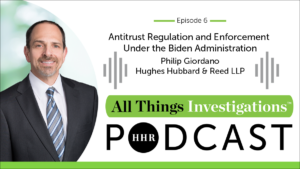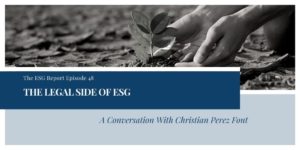After the Russian invasion of Ukraine, the world of business will never be the same again. Deputy Attorney General (DAG) Lisa Monaco recently said that the world’s “geopolitical landscape is more challenging and complex than ever. The most prominent example is of course Russia’s invasion of Ukraine.” It is “nothing less than a fundamental challenge to international norms, sovereignty and the rule of law that underpins our society.” This is even more so in the current business climate.
Over this five-part series, I will consider how business will never again be the same and how a confluence of events has changed business forever. I am joined in this exploration by Brandon Daniels, Chief Executive Officer (CEO) of Exiger. We will explore the irrevocable changes in Supply Chain, trade and economic sanctions, anti-corruption, cyber-security and environmental, social and governance (ESG). In Part 1, we begin with changes in the supply chain as there may well be no area of businesses which has experienced the tectonic shifts that have occurred in the marketplace over the past couple of years than in Supply Chain.
Daniels identified three key reasons for these shifts. The first began with the realization of the untenable actions of the major player on the US supply chain, China. This realization had begun pre-pandemic, when it became clear of the massive theft of US intellectual property by Chinese businesses which led to a huge counterfeit goods problem coming out of China. Daniels estimated that “70% of the world’s counterfeit market is driven by China.” The second was the slave labor issue with China, particularly the Uyghurs. This extensive use of slave labor gave China an economic advantage which in many cases could not be overcome. It was economic warfare by another name.
All of this was exacerbated by the pandemic and we saw what it meant to have an economic and geopolitical adversary as one of your key suppliers during a true worldwide healthcare crisis. This confluence of events led to several key changes in thinking about supply chain. First, supply chain efficacy is not about weather events, it is not about logistics, it is not about just in time. There are much broader sets of issues for supply chain that had not come to the fore previously but came much more clearly into focus, such as geopolitical tensions. According to Daniels, “we realized that supply chain is multifaceted in terms of issues.”
Next came the recognition of the need for more and greater government oversight and regulation. The need to stamp out modern slavery led to the passage of the Uyghur Forced Labor Prevention Act. This law significantly expanded compliance requirements for companies to certify that goods made with forced labor in the Xinjiang Uyghur Autonomous Region of the People’s Republic of China do not enter the United States. Interestingly, the law created the presumption that all goods produced in Xinjiang were produced using forced labor, with the burden of proof resting on companies to demonstrate that materials, parts, and goods originating in China were not mined, produced, or manufactured wholly or in part in Xinjiang. There was also a business and government realization that many of the key rare earth elements and minerals widely used in US manufacturing process came from China and now Russia.
Daniels put all of this into perspective when he said, “you had this big earthquake in the pandemic, but then you had all these fault lines that we didn’t realize that were on the edge of a precipice. We were in these really brittle places and just all fell apart with the Russian invasion of Ukraine. From rare earth elements like neodymium which is used in securing a F35 to electric car batteries, to metals and heavy metals used in standard manufacturing processes such as aluminum, iron and neon; supply chain disruptions were all acerbated by the Russian invasion of Ukraine on top of the ongoing disruptions from the pandemic and beyond.”
Finally, was a new element to the supply chain calculus, what Daniels termed “the ethical conundrum.” Russia has engaged in a brutal unjustified war that has disrupted the flow of goods and services from both Russia and Ukraine. Neon, a key element for processing chips, is heavily concentrated in Ukraine as are some of our largest outsourced engineering software companies. As the US and EU governments have responded with a series of harsher and more robust economic and trade sanctions the pressures on supply chain have increased. You must look at greater and more ongoing due diligence and greater sustainability.
These issues have moved beyond simply national security issues in the governmental and public sector. As DAG Monaco said, “Increasingly, you and your clients are on the front lines in responding to these geopolitical realities…our goal is not only to hold people accountable, but to disrupt these threats using all the tools available to us.” Private companies must understand they are now a part of what Daniels characterized as “continuous non-kinetic warfare.”
But in addition to this new type of warfare of which every business is now a part of going forward, it all ties back to US economic prosperity. While this was clear in the US adversarial relationship with China pre-pandemic; it accelerated during the pandemic and now after the Russian invasion of Ukraine. If you could not get a mask so that you could go to work during the pandemic, that health issue became an economic issue. If you were doing business with a Russian oligarch, the reputational damage to your top line will negatively impact your company, perhaps in a material manner.
Tomorrow we consider why economic and trade sanctions will never be the same.







